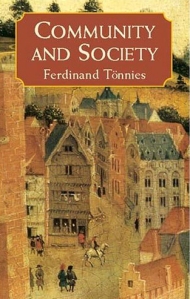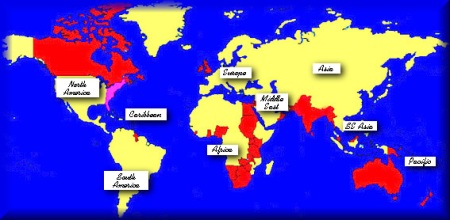 I’ve just revisited Ferdinand Tonnies‘ book Community and Society. You could have come across it in a course for community leaders or in any sociology course from introductory to advanced level. It’s an indispensable source. First written in 1887, it’s the ‘founding work’ in the sociology of community.
I’ve just revisited Ferdinand Tonnies‘ book Community and Society. You could have come across it in a course for community leaders or in any sociology course from introductory to advanced level. It’s an indispensable source. First written in 1887, it’s the ‘founding work’ in the sociology of community.
Everyone who has taken courses about community is familiar with the distinction Tonnies draws between local co-operative communities – Gemeinschaft and global competitive market societies – Gesellschaft.
Read the original book carefully and it’s clear that he did not believe in a simple community = good and society = bad equation.
That crude distinction comes down to us from the ancient world: Plato’s ideal communities in the Republic and the Laws versus the Sophists; Confucius’ ideal community in the Analects versus the Chinese Legalists and so on. This sharp opposition was a recurring theme in the Romantics and in many later counter-cultures.
What Tonnies rejects is clear, but what he agrees to is rather confused. It appears it’s all a matter of Will. Community comes from Natural Will and Society from Rational Will. He also draws a sharp distinction between his theory and the real world social order. So his theory cannot lead to a social science that can predict things. When first published Tonnies’ book went largely unnoticed. When republished in 1912 its sales took off when it was taken up by romantics who mistook its argument as being for an earlier age of community, of Gemeinschaft.
With hindsight it could be that Tonnies had been looking at a solution all along – but not drawing the correct conclusion. A signs of communities conclusion. He came from a rural German background to Oxford University when Britain had a vast global empire. The University was a society dominated by communities with global connections, dominated by financier, merchant and rentier money signs.
What struck me as odd in Tonnies’ book is that there’s no real consideration of money in his definition of society or of community. Yet the British Empire he saw from its centre when he was at Oxford was an empire of money. It dominated the world through its control of the gold supply backed up by its navy. In Tonnies’ world and in our world – money is the supreme social sign. For the British Empire this was especially true. The book’s first publication coincided with the start of a long depression which resulted in the relative decline in manufacturing from which the island of Britain would never recover. A depression in which the power of finance was the key factor
A warm, mutually supportive financier community directed the colonial genocides, famines and slavery. It thrived on depression and industrial decline at home. A community, a Gemeinschaft, with shared life experiences from the cradle to the grave. Their harmed populations were re-made into societies, into Gesellschafts.
So the relation between community and society is one of coexistence in time. There was no clear-cut golden age of community declining later into a dark age of society as the romantics and counter-culture people believe.
Perhaps if Tonnies had thought of community and society as different systems of signs he could have led the social sciences onto a rewarding new route. A road not taken – over a century ago.





 Posted by the author
Posted by the author